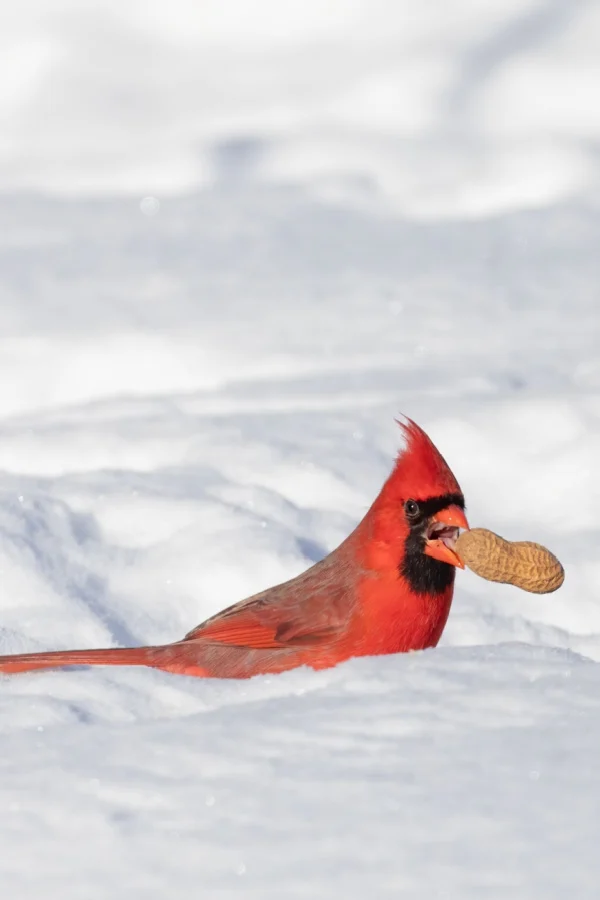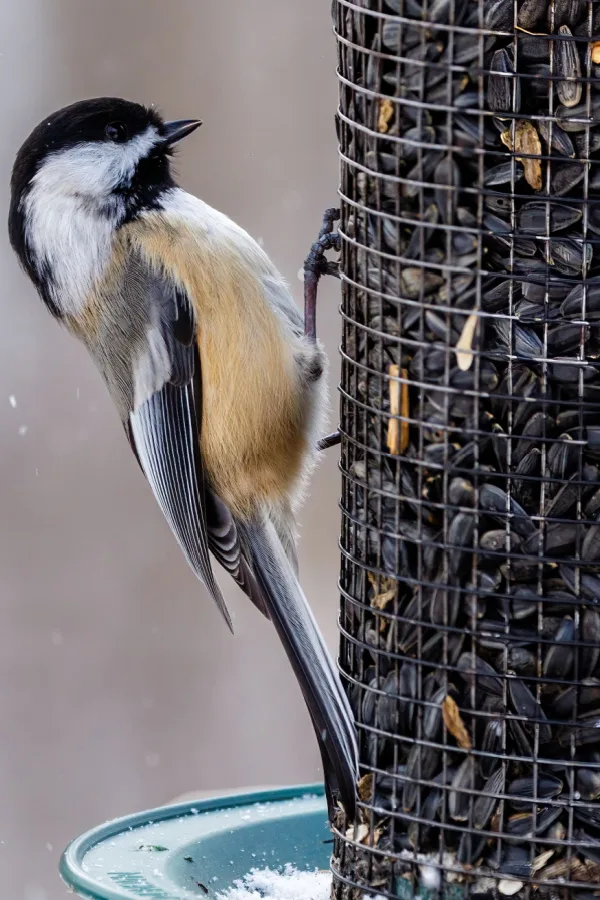Did you know that it’s not only easy to make your own bird feed at home – it can also be far more nutritious for the birds you feed than commercial options?
Unfortunately, many times, in order to feed birds healthy, nutritious food, you often have to pay a premium price. And even worse, good quality commercial birdseed continues to get more and more expensive each year. And with little hope that it will ever come back down.
But not only can commercial bird feeds be expensive, they also often contain all kinds of unnecessary filler ingredients. Sadly, these useless fillers don’t provide much in the way of nutrients or calories to birds, but they do add to the per pound cost of the feed!

The winter can be a challenging time for birds that forego migrating to stay at home. Gone are the plants, seeds, and insects that they are used to feeding on during the warmer months. And while using commercial bird food is helpful, most mixes simply don’t provide the birds with the energy they truly need.
But that is exactly where making your own feed at home is the perfect solution. Not only is making birdseed simple, it can also be far less expensive. And best of all, you can give your backyard birds exactly what they need to not just survive, but thrive!
How To Make Your Own Bird Feed – With Ease!
When making homemade feed for birds, you need to include as many different nutritious ingredients as possible. Birds need a good balance of fats, protein, and fiber. All three of these work in harmony to keep them healthy and strong all year long.
The great news is that almost all of these ingredients can be purchased in bulk at local feed stores or online. Purchasing in bulk will not only save you time but also money in the long run. Even better, it will help ensure you always have plenty of ingredients on hand to refill those bird feeders!
Choosing Your Ingredients
There are a whole slew of seeds and natural ingredients you can include in homemade birdseed. But the trick to getting the most bang for your buck is to select seeds and ingredients that are high in nutrients and easier on your wallet.

First and foremost, making your own feed means you can keep out useless filler ingredients such as milo and similar grains. These products add very little nutritious value compared to other available ingredients.
The fillers might be low in cost, but in addition to being low in nutrient value, they are also usually ignored by birds – making them nothing more than a waste of money to include. And even worse, something you have to clean up under the bird feeders!
4 Great Ingredients To Make Your Own Great Bird Feed
Black Oil Sunflower Seeds
Black oil sunflower seeds are one of the absolute best ingredients to add to homemade birdseed mixes. They provide a high fat and fiber content and even provide the birds with some protein.
There are all kinds of varieties of sunflower seeds available. All are wonderful for birds and great for including in your feed mixes, but always be sure to include at least some black oil seeds in the mix. They are by far the best option for high nutritional value, giving you the most value for your money.
Whatever combination of sunflower seeds you include, make sure they are unsalted and unflavored. As much as humans might like spicy, bbq, or ranch-flavored sunflower seeds, they are not exactly great for birds!

You can give sunflower seeds to birds either in or out of the shell. Some smaller birds might have a harder time shelling the seeds, so offering a mixture of both is the best option.
Popular birds that enjoy sunflower seeds are cardinals, finches, sparrows, goldfinches, woodpeckers, and nuthatches. (Affiliate Product Link: Meadow Ridge Farms Bulk Black Oil Sunflower Seed)
Peanuts
When it comes to getting great nutritional value at a great price, peanuts are a winner-winner for birds! Peanuts are a great source of nutrients and are perfect to add to homemade birdseed mixes.
They are high in fiber and oil and are an excellent source of protein. Best of all, they can be extremely affordable when purchasing in bulk.
Similarly to sunflower seeds, you can add them to your mixture either in or out of the shell. The best option is to use a bit of both in your bird feed since some birds prefer one over the other. Affiliate Link: CountryMax Backyard Seeds Shelled Whole Peanuts for Woodpeckers, Birds
Birds like blue jays, cardinals, wrens, chickadees, nuthatches, titmice, and woodpeckers all enjoy snacking on peanuts. Blue jays can get a bit aggressive when feeding with other birds, so placing whole peanuts in a separate area can do wonders to keep everyone happy!
This Week’s Featured Podcast!

Cracked Corn
Cracked corn is another inexpensive ingredient to buy in bulk for adding to bird mixes. Especially in the fall when many local feed mills have plenty on hand! It is high in fiber and protein and a wide variety of bird species love snacking on it.
Doves, sparrows, woodpeckers, blue jays, and juncos are all attracted to cracked corn – as are cardinals, quail, starlings, and grosbeaks. In fact, there aren’t many bird species who will turn their nose up to it.
While you can use whole corn kernels, cracked corn is easier for smaller birds to consume. When paired with black oil sunflower seeds, it makes one of the most nutritious and delicious birdseed feeds around.
White Millet
Often confused with milo, white millet makes an excellent addition to homemade birdseed. Both milo and white millet are small and round and often fall out of feeders and end up on the ground. But while the birds will leave the filler milo alone – they love ground snacking on white millet!
White millet, unlike milo, is a great source of calcium, protein, phosphorus, and magnesium for birds. Because of its tiny size, it will often fall out from feeders as birds feed – but this can be especially helpful for birds that like to feed on the ground such as cardinals, doves, sparrows, and thrashers.
Much as the case with sunflower seeds, peanuts and cracked corn, white millet is much more economical than many of the other bird seed options – and yet, highly nutritious. Affiliate Product Link: Olympus Myco Premium White Proso Millet
Mix & Match For The Best Feed Around!
By combining these four basic ingredients together to make your own homemade birdseed, you will not only be saving money in your budget but you will also be able to know you are helping to provide a nutritious and tasty feed for your local birds.
Simply store any unused ingredients in sealed plastic or metal containers and keep them in a dry location until you are ready to use more.
If you are interested in giving your birds an even bigger boost of energy and calories during the winter months, check out “How To Make Homemade Bird Suet”.
Simple Garden Life
Follow Our Facebook Page For Even More Great Tips! Simple Garden Life Facebook Page
Simple Garden Life is a website dedicated to keeping gardening fun, simple and enjoyable! We publish two new articles each week along with a new garden podcast episode every two weeks. This article may contain affiliate links.
